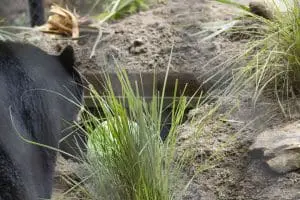
Our animal care team wasn’t quite sure what to expect when we built dens for our two Florida black bears, Cheyenne and Brody. After a few months with the dens, we are excited to share that we have learned a lot!
Florida black bears naturally enter a semi-hibernation state called torpor during the wintertime when food is typically scarce. Some bears opt to spend this time in a den. Our keepers had noticed Cheyenne attempting to build her own den during previous winters, and last year, we gave her and Brody the start of their own dens.
One of the most exciting and important things we learned: Even though they spent little to no time in the wild in their youth, both Brody and Cheyenne still exhibit the behavior of bears in their natural range – if given the proper resources.
Brody did not den, but he did slow down, reducing his eating and defecating. This is typical of a young male black bear.

Florida black bear Brody peeks inside one of the new dens in the bear habitat.
Cheyenne spent over a month in the den sleeping. She did not eat, drink, defecate or urinate during this time, as is typical for denning black bears. She has lost 20 pounds so far, and we expect to see more weight loss into spring. In the months leading up to this season, Cheyenne gained over 50 pounds in preparation for this weight loss.
We also learned that bear territories are important and fully established even in human care. Cheyenne claimed the main yard and its den early in the season.
Once this happened, Cheyenne no longer accepted Brody in this space. Our animal care staff continued to allow him in the main yard under supervision throughout the fall season so Brody and Cheyenne could actively carry out natural territorial behaviors. Cheyenne would chase Brody out of the yard repeatedly, chomping, huffing and slapping the ground. Brody would huff and run away to the security of the side yard.
“Observation and behavior reading is huge and determines when they are not together,” said Lauren Hinson, director of animal programs.
We kept Brody from the main yard during denning time to reduce stress for both bears. In their natural habitat, a female bear in her den would not accept a wandering male bear in her space. Even while she was in torpor, Cheyenne was still completely aware of her surroundings. She would occasionally leave her den to charge at Brody at the mesh door between their habitats – and then return to her den for sleep.
As the temperatures continue to warm, we expect to see Cheyenne leave her den more. With that, we plan to have the two bears share the main yard again as we expect Cheyenne’s territoriality to decrease once torpor passes.
We know that some of you have missed having an active bear in the main habitat – so we are looking forward to having both bears in the yard again!
Brevard Zoo is an independent, not-for-profit organization that receives no recurring government funding for our operating costs. Your generous support enables us to continue to serve our community and continue our vital animal wellness, education and conservation programs.
